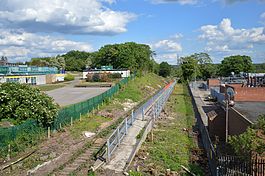Watford Stadium Halt railway station
| Watford Stadium | |
|---|---|
 |
|
|
Location of Watford Stadium in Hertfordshire
|
|
| Location | Watford |
| Local authority | Borough of Watford |
| Grid reference | TQ102954 |
| Number of platforms | 1 |
| Railway companies | |
| Original company | British Rail |
| Key dates | |
| 4 December 1982 | Station opened |
| ? | Last train called |
| 22 March 1996 | Last train ran on line |
| 29 September 2003 | Official closure |
| Replaced by | none |
| Other information | |
| Lists of stations | |
| WGS84 | 51°38′48″N 0°24′30″W / 51.6467°N 0.4083°WCoordinates: 51°38′48″N 0°24′30″W / 51.6467°N 0.4083°W |
|
|
|
Watford Stadium railway station is a disused railway station in Watford, Hertfordshire, United Kingdom on the branch line from Watford Junction to Croxley Green. It served Vicarage Road stadium, home of Watford F.C., and was open only on match days.
The Watford and Rickmansworth Railway opened its line between Watford Junction and Rickmansworth (Church Street) via Watford High Street in 1862. The line was soon taken over by the London and North Western Railway (LNWR), who in 1912 opened a branch line to Croxley Green, with a new intermediate station at Watford West.
Watford Stadium station did not come into existence until 1982, 70 years after the branch had been opened. It was built to serve Vicarage Road Stadium as a means of managing the crowds attending football matches; prior to this, the nearest stations available to football fans were Watford High Street and Watford Junction. A direct transport connection from the stadium would enable football officials to keep fans of "away" teams separate from Watford F.C. supporters and reduce instances of football hooliganism in Watford town centre. The station acquired the nickname of "Hooligan Halt".
Development of the station was funded jointly by the Football Trust, which contributed £50,000, Watford Borough Council (£80,000), Watford F.C. (£50,000), with the remaining £200,000 paid by British Rail. It was officially opened on 4 December 1982 by the rock musician and chairman of Watford Football Club, Elton John, and chairman of the Football Trust, Lord Aberdare. The inaugural train rolled into the station five minutes late. The station was only open on match days, with the first crowds passing through the station being Manchester United fans on the opening day.
...
Wikipedia

